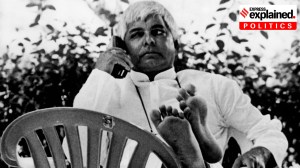Oli-garchy falls: PM quits, President offers to talk to protesters as Parliament set ablaze
Army calls for calm, says committed to protecting people's interests, security; dissolution of Parliament is pre-condition for talks, says an outfit behind protests
 Protesters take selfies and celebrate at the Singha Durbar, the seat of Nepal's government's various ministries and offices, after it was set on fire during a protest against social media ban and corruption in Kathmandu, Nepal, Tuesday, Sept. 9, 2025. (AP Photo/Niranjan Shrestha)
Protesters take selfies and celebrate at the Singha Durbar, the seat of Nepal's government's various ministries and offices, after it was set on fire during a protest against social media ban and corruption in Kathmandu, Nepal, Tuesday, Sept. 9, 2025. (AP Photo/Niranjan Shrestha)Amid a deepening political crisis in Nepal, following a sharp escalation in the anti-government “Gen Z protests” a day after 20 youths were killed in police action, Prime Minister K P Sharma Oli resigned on Tuesday.
Defying curfew orders, protesters hit the streets for the second day in Kathmandu, blocking roads, storming government buildings — including Parliament, the President’s office, Supreme Court and political party offices — and setting them on fire, targeting the private residences of President Ram Chandra Poudel, Oli and some former Prime Ministers among others, and also, in some cases, attacking political leaders. Protests were also reported from other parts of the country.
In Kathmandu’s Dallu area, a mob set a house belonging to former Prime Minister Jhala Nath Khanal on fire. His wife, Rajyalaxmi Chitrakar, sustained serious burn injuries and was rushed to hospital, where she died.
The Tribhuvan International Airport in Kathmandu was closed as smoke from nearby fires set by protesters could endanger the safety of aircraft, the Civil Aviation Authority of Nepal said.
As the protests intensified, Oli announced that he was stepping down. The President accepted the resignation and appointed Oli to lead a caretaker government until a new one is in place. But with both Poudel and Oli in hiding, Nepal has drifted into a situation of unprecedented chaos and uncertainty.
An aide to Poudel told Reuters the President had begun the process of finding a new premier, and also called protest leaders for talks.
 Protesters celebrate at the Singha Durbar, the seat of Nepal’s government’s various ministries and offices, after burning it down during a protest against a social media ban and corruption in Kathmandu, Nepal, Tuesday, Sept. 9, 2025. (AP Photo/Niranjan Shrestha)
Protesters celebrate at the Singha Durbar, the seat of Nepal’s government’s various ministries and offices, after burning it down during a protest against a social media ban and corruption in Kathmandu, Nepal, Tuesday, Sept. 9, 2025. (AP Photo/Niranjan Shrestha)
In a video message, Nepal Army Chief General Ashok Raj Sigdel also urged protesters to stop the demonstrations, prevent further loss of life and property, and engage in dialogue. Later at night, the Army took control of the Kathmandu airport as well as the government’s main secretariat building.
Announcing that it was taking charge of security operations from 10 pm, the Army, in a statement issued by the Directorate of Public Relations and Information, said that “some groups are taking undue advantage of the difficult situation and causing severe damage to ordinary citizens and public property”. It warned that all security mechanisms, including the Nepal Army, would be mobilised to contain the violence if such activities continue. It also appealed for public cooperation, urging citizens not to engage in or support destructive acts.
Meanwhile, ‘Next Gen Nepal’, one of the outfits behind the ongoing protests, called for “calm and discipline” and said while they were ready for dialogue, Parliament would have to be dissolved first. “Our participation and emotional solidarity is important for this movement, but at the same time, restraint and discipline are very important too. Loss of properties is the loss of our own property, therefore, be calm and disciplined. Our generation is now ready to take on the responsibility for the future, and for that, your patience and restraint will empower us. We are ready for dialogue, but dissolution of Parliament is a pre-condition,” it said in a post on social media.
“Before we build the country, it is necessary to save the country… As a result of our movement, the government has come to its knees, and PM Oli has resigned, clearing the process for a way out. The country has come under our leadership, and to protect public property is our responsibility. We appeal to all who have joined the movement to exercise restraint and not to damage public property. We are working on new guidelines, our minimum demand is the formation of a civilian government under a leadership acceptable to all, and prepare for fresh elections,” Tanuja Pandey, one of the faces behind the protests, said in a post on social media.
 Protesters throng Singha Durbar, the seat of Nepal’s government’s various ministries and offices during a protest against social media ban and corruption in Kathmandu, Nepal, Tuesday, Sept. 9, 2025. (AP Photo/Niranjan Shrestha)
Protesters throng Singha Durbar, the seat of Nepal’s government’s various ministries and offices during a protest against social media ban and corruption in Kathmandu, Nepal, Tuesday, Sept. 9, 2025. (AP Photo/Niranjan Shrestha)
In his resignation letter, Oli said: “In view of the adverse situation in the country, I have resigned effective today to facilitate the solution to the problem and to help resolve it politically in accordance with the Constitution”. Television visuals showed protesters barging into the compound of his private residence and ransacking the property, before setting it on fire. Oli, 73, was sworn in for his fourth term in July last year as the country’s 14th Prime Minister since 2008.
Former Prime Minister and Nepali Congress leader Sher Bahadur Deuba, Communist Party of Nepal (Maoist Centre) leader Pushpa Kamal Dahal alias Prachanda and Ramesh Lekhak, who resigned as Home Minister on Monday, were among those whose houses were also set on fire. A private school, where Deuba’s wife and foreign minister, Arzu Deuba Rana, is the chair of the board of trustees, was also set on fire. Videos shared on social media showed protesters assaulting Deuba and his wife; both appeared to be bleeding.
The protesters also set fire to the ministers’ quarters in Bhainsepati; Army helicopters ferried some ministers to safety. At least two of Oli’s close allies —Finance Minister Bishnu Paudel and parliamentarian Ek Nath Dhakal — were chased on the streets; the latter was also stripped. Protesters also stormed the central jail in Nakkhu and freed Rabi Lamichhane, a former Deputy Prime Minister and Chairman of the Rastriya Swatantra Party, who was jailed for alleged corruption.
This came a day after 20 protesters were killed in police action on Monday. While the immediate trigger was the recent ban on over two dozen social media sites, which was revoked on Monday night, the ongoing protests have targeted the government over “rampant corruption” and sought accountability.
 A protester waves a national flag as vehicles burn during a protest against a social media ban and corruption in Kathmandu, Nepal, Tuesday, Sept. 9, 2025. (AP Photo/Niranjan Shrestha)
A protester waves a national flag as vehicles burn during a protest against a social media ban and corruption in Kathmandu, Nepal, Tuesday, Sept. 9, 2025. (AP Photo/Niranjan Shrestha)
Oli’s resignation on Tuesday came hours after his appeal to the protesting youths to come for dialogue failed to get a response, and the Nepali Congress, an ally in the ruling coalition, sought to withdraw support.
Meanwhile, former King Gyanendra Shah condoled the deaths and wished a speedy recovery to those injured. He also appealed to all sections to seek a solution.
In a statement earlier in the day, the Nepal Army urged protesters to remain calm and maintain national unity as it vowed to protect the country’s independence, sovereignty and territorial integrity. “We are analysing the latest developments of the Gen Z movement,” it said. “Nepal Army is always committed to protect the interests and security of Nepalese people, and keeping the latest developments in mind, we express our commitment towards protecting the life and property of the people,” it said, as it requested “all the youths and the entire countrymen to remain calm and maintain social harmony and national unity so that the present situation doesn’t deteriorate further.”
The Nepal Army chief and other senior officials also issued a joint appeal, urging protesters to exercise restraint and resolve the crisis through dialogue. “As the Prime Minister’s resignation has already been accepted by the President, we call upon all to exercise restraint and not to allow more loss to life and property in this difficult situation… A peaceful resolution through dialogue is the only way to restore order and stability,” said the statement. The signatories included Chief Secretary Ek Narayan Aryal, Home Secretary Gokarna Dawadi, Armed Police Force Chief Raju Aryal, Inspector General of Police Chandra Kuber Khapung and National Investigation Department Chief Hutraj Thapa.
On September 4, the Nepal government had banned over two dozen social media sites, including Facebook, WhatsApp, X, Instagram and YouTube, for failing to register with the Ministry of Communication and Information Technology within the given deadline. While the government had said the social media sites were banned to bring them under regulation, protesters called it an attack on free speech. The ban was revoked on Monday night.
With agencies, Kathmandu



- 01
- 02
- 03
- 04
- 05




























